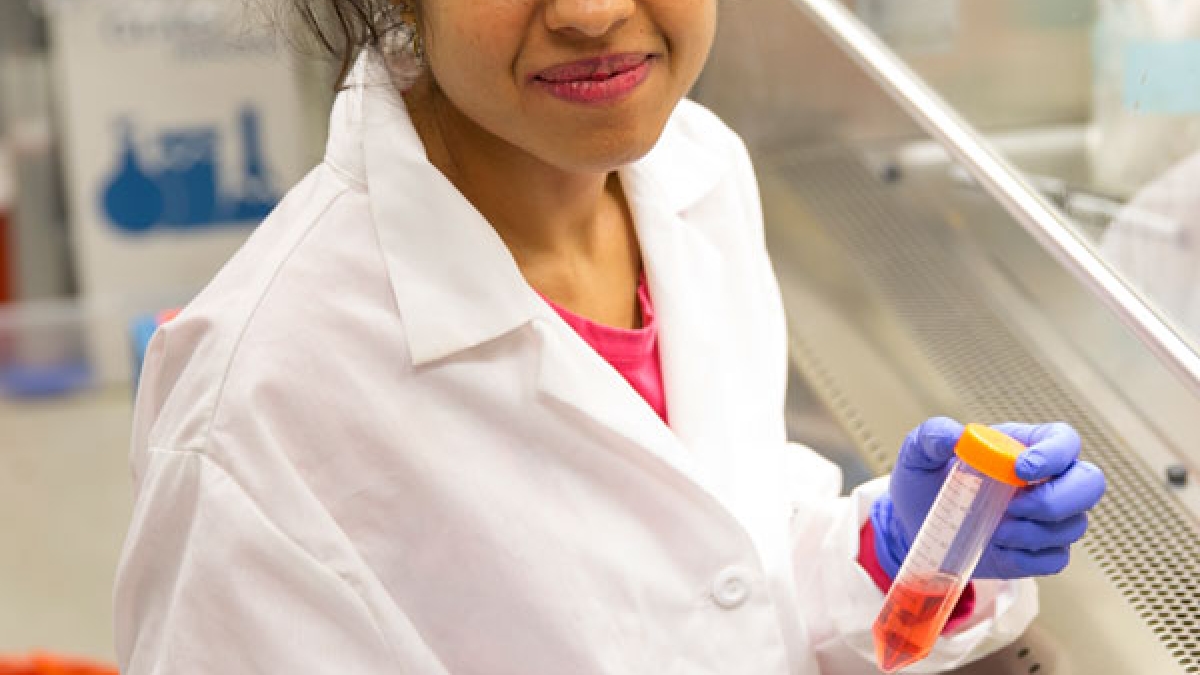ASU researcher investigates new treatments for dormant, lethal cancer cells

Chemical engineering assistant research scientist Sheba Goklany received a three-year, $225,000 New Investigator Award from the Arizona Biomedical Research Commission to develop new treatments for breast cancer. Photographer: Nora Skrodenis/ASU
The second leading cause of cancer-related deaths in women in the United States is breast cancer. Despite early diagnosis and no trace of active tumors after treatment, as many as 30 percent of patients relapse, even decades later, often due to dormant cancer cells that go undetected.
Conventional chemotherapeutic drugs have little to no effect on these dormant cancer cells often responsible for relapse, so researchers at Arizona State University are investigating tumor environments in order to develop better treatments for dormant and proliferating cancer cells.
Sheba Goklany, a chemical engineering assistant research scientist in ASU’s Ira A. Fulton Schools of Engineering, is working to develop innovative therapeutic strategies to eliminate dormant and active cancer cells to better treat patients and decrease the relapse rate.
“We are working toward developing novel strategies that would only target cancer cells without affecting normal cells of the body, which is a major concern among current chemotherapeutic regimens,” Goklany said.
As this is an important issue for patients in Arizona and the United States, the Arizona Biomedical Research Commission (ABRC) granted her a New Investigator Award to help her achieve this important breakthrough.
The ABRC seeks to help new investigators generate the preliminary data necessary to apply for larger federal grants through its New Investigator Award. Goklany will receive $225,000 over three years to aid in her research with ASU faculty and partners at the Mayo Clinic and the University of Arizona.
Goklany is involved in developing unique treatments and testing their efficacy in chemical engineering Professor Kaushal Rege’s Molecular and Nanoscale Bioengineering Lab.
“She will develop a new three-dimensional cell culture system and investigate this approach to study dormancy in breast cancer,” said Rege, Goklany’s senior mentor and a faculty member in the School for Engineering of Matter, Transport and Energy.
She and the research team will use new types of hydrogels called Amikagels for growing breast cancer cells that would mimic the tumor microenvironment in the body.
“As part of this research we will develop a robust platform to investigate the 3-D tumor microenvironment in dormant and proliferative breast cancer cells using novel aminoglycoside hydrogels developed in our lab,” Goklany said. “During this three-year period, we hope to accomplish groundbreaking research that would potentially eliminate relapse of breast cancer with the intent of translating these therapeutic strategies into the clinic.”
Rege says this research will lead to the development of a new tissue-engineered model of breast cancer that can lead to fundamental advances and a translational impact in breast cancer.
“This research advances the impact of biomedical engineering research in cancer,” Rege said. “This award will help put the Fulton Schools and ASU on the map in developing novel cancer technologies, and strengthen our research partnerships with our partners in the Valley."
Goklany says she is honored to be selected for the prestigious award from the ABRC.
“It is not only very humbling to be recognized by ABRC,” she said, “but it also serves as an excellent opportunity to find new cures for breast cancer that could potentially save lives."
More Science and technology

Compact X-ray laser lab aims to reveal deep secrets of life, matter and energy
X-rays allow us to view inside the human body to diagnose broken bones and other hidden problems. More recent X-ray advances are…

Apollo lunar samples enable ASU researcher to pinpoint moon’s crystallization timeline
A team of researchers, including Arizona State University geochemist Melanie Barboni, in collaboration with scientists from The…

NASA launches space telescope to chart the sky and millions of galaxies
California’s Vandenberg Space Force Base was the site for Tuesday’s 8:10 p.m. launch of the NASA SPHEREx mission aboard a SpaceX…

